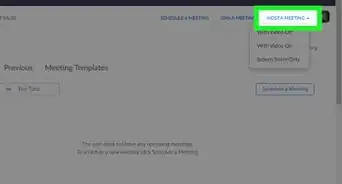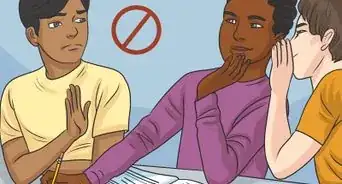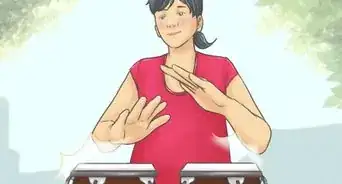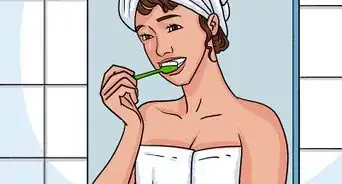wikiHow is a “wiki,” similar to Wikipedia, which means that many of our articles are co-written by multiple authors. To create this article, volunteer authors worked to edit and improve it over time.
Learn more...
Countries around the world have a few grade levels of school that are collectively called "middle school". Middle school usually encompasses grades 5-8, 6-8 or 7-9. This means that kids are usually 11-14 years old when they're in middle school. Middle school is definitely a change from elementary school, as it is meant to prepare you for high school. You deal with things such as puberty, more homework, increased competition, applying to private high schools, increased amount of tests, and more in a private middle school. This article will show you how to enjoy attending a private middle school, plus the similarities and differences between public and private middle schools.
Steps
Rules and Expectations
-
1Know that your parents have to pay money to go to a private school. All private schools, no matter single-ed or co-ed, religious or non-religious, require guardians and parents of students to pay tuition. Less expensive private schools may only cost 3,500 dollars. Elite private schools (usually attended by royalty and celebrities' children) can cost as much as 60,000 dollars. [1] [2] So, you should be grateful that your parents are putting in their hard work from their job into your education. They use their hard-earned money from their job and use some of it to pay for better education.
- Understand that you are lucky to go to a private school! Private schools use the money from the paid tuition to hire teachers that actually have an interest in teaching (and teach well), buy school supplies for all of the students, and to renovate the school if it needs repairs.
- Some public schools are rated badly because they are underfunded, meaning that they do not have enough money to hire good teachers that teach well, to buy basic school supplies, or to renovate the school.
-
2Know that private middle schools are usually more strict than public ones. If you went to a public middle school, you may be surprised by the number of rules the school enforces. Mediocre or below-average public school districts have more rates of students acting out or disobeying the rules in the schools, either because the school administration does not actively enforce them or because the students frequently break rules. So, you should be aware of these new rules.
- If your old school allowed home electronics like tablets, laptops, and phones, you may be shocked to see that your private middle school places restrictions on these. You may not be able to use your phone in class at all and have to store it in your bag or locker. Technology such as smart watches may be banned.
- Along with uniforms (which most private middle schools require), there will likely be a dress code. The strictness depends- some schools may allow light makeup, while others ban it. Some schools require a specific type of shoe to be worn with the uniform, whereas others have no restrictions on shoes. Brightly dyed hair may be banned. Check with the school to make sure you know what you can wear and what you can't wear.
Advertisement -
3Understand that you will likely need to wear a uniform. Most private middle schools have required uniforms for students. Some public schools also have uniforms, but some of them can be bought in any shopping center, as they are more generic and don't have the school's logo or emblem on it. Private schools have "fancier" uniforms, which may need to be bought directly from the school or from a uniform store. These uniforms are well-made and have the school's logo on the top left or right if it is a polo shirt or jumper. [3]
- For males, the uniform could include a polo shirt, a belt, trousers, and white or black socks. Some schools require males to wear ties, whereas other schools don't have ties in their uniform. For females, the uniform could include a white, red, or blue polo shirt, a skirt, leggings, and white or black socks. There will likely be a gym uniform too, with a T-shirt and shorts or a sweater and sweatpants with your school's logo or emblem on it.
- You may feel like uniforms restrict you from expressing yourself. You may have gotten used to throwing on a cool T-shirt with designs on it every day before school, but now you have to stick with a polo shirt, jumper/skirt, and navy leggings or a polo shirt and trousers. In reality, there are still so many ways to express yourself with a uniform.
-
4Know that private schools will have different curricula than government-regulated schools. Understanding this early on won't cause you to get all worried about the different assignments and topics being taught in your private middle school. If you're in the U.S., public schools have the Common Core curriculum, which follows the education standards. Many private schools do not follow the state's or country's curriculum and instead teach their own, as the government does not run these schools. [4]
- Middle school is when the difference in curricula increases. Multiple private schools have accelerated curricula in middle school and high school, so if you're in a public school, you'll need more time to catch up.
- For example, private middle schools may teach pre-algebra in sixth grade, algebra in seventh, and geometry in eighth. You may be offered lower levels of courses such as pre-algebra or algebra in eighth, although this may not be possible in lower grade levels. This widely contrasts with the Common Core curriculum in public schools; pre-algebra is taught all the way in eighth grade. Algebra and geometry are moved to high school and are considered high-school-level courses in public schools. Basically, the math curriculum in private middle schools may be 1-2 grades ahead of the curriculum in public middle schools.
- Because of this, you may need extra support with a teacher, parent, older sibling, or tutor due to the differences in curriculum.
-
5Understand that you will likely attend a private high school. If you've been in private school all your life, you will most likely go to a private high school. But, you will need to apply to them- you don't automatically enter one or get admitted because you filled out the application forms for the school. Apply to 2-4 private high schools, as not all of them will accept you. You will have to write some short essays and get recommendation letters from teachers and send them to the school's email.
- Some private high schools require interviews with the parents and the student.
Acting in a Private Middle School
-
1Listen to all of the rules and expectations. Sure, most schools have boring and generic rules like, "Be kind to others", "Don't talk during class", "Pay attention during class", and "Follow the instructions". But there may be some extra rules that your previous school did not implement, which could surprise you when you get in trouble since you did pay attention to the rules. You do not have to take notes on the rules or do anything extra though; just make sure you get the new rules right.
- Do not break the rules. This is probably applied to any school, whether public or private, elementary or high school. This is true, but private schools may impose stricter punishments on kids who break the rules.
- Your previous school may have only given you a reminder not to interrupt during class, but private schools may do more, like have an after-class chat with you about your behavior.
-
2Participate in class. Since there are on average, less students in private schools than public schools, the teacher is more likely to call on you. Not only can your teacher see all of the students (even those who sit at the last row in the classroom), they are also expecting participation. If your original school had 35 students in 7A (7th grade, class A), you have a one out of thirty-five chance in getting called on. If you're in a private school, there may be 15-25 students, which means that you will have a 1/15th-1/25th chance in getting called on.
- Participation counts in your gradebook in numerous schools, so raise your hand every now and then, even if you don't know the answer.
- The curriculum can be challenging, but it's recommended to take risks. Even if you get the answer incorrect, it's a valuable learning experience. The teacher may explain why you got the answer wrong so you can understand how to correct it.
-
3Cope with the different and challenging workload. Since private schools have different curricula, you may feel stressed out about how to catch up to your other peers that are used to this system already. The science and history curricula may be totally different. Additionally, math can be more challenging. For example, if you went to a public middle school, you may be taught negative numbers, proportions, arithmetic with fractions and decimals, and geometry such as finding the areas and circumferences of circles. [5] . In a private school, pre-algebra or algebra may be taught in seventh grade. This means simple equations (such as x + 3 = 5) and slopes of lines will be taught in the beginning of the year, which may be simple at first. This will progress to exponential growth and decay, quadratic equations, and sequences, which will take much more time to master.
- Private schools usually offer more homework. You may find that you take 1 hour and 30 minutes to do your homework in sixth grade instead of an hour or 1 hour and 50 minutes in eighth grade instead of 1 hour and 20 minutes.
- Take your time to do it and don't rush through it- if you correct your homework in class, you'll find that many answers are incorrect. Your handwriting may be messy for the teacher to read, making those corrections only partial credit.
- If work gets too stressful, ask a teacher after class for help. In middle school, there are designated "office hours", which are usually after-school help sessions that you can ask for help in. You could also get help during advisory sessions, which are classes offered by some schools that teach social-emotional learning. These classes are usually short, so half of the advisory period is designated as office hours.
Making Friends in a Private Middle School
-
1Say hi to someone during class transitions, breaks, lunch, and afterschool activities. In middle and high school, you will need to move from classroom to classroom. All of this moving around takes time, so there are usually 1-5 minutes to chat a bit outside of the classroom. Breaks and lunch are also long times to chat, so feel free to start a conversation with a kid sitting alone or a few girls talking. If you stay after school for clubs or for study hall, chances are, you'll meet people like you staying at school in the late afternoon (4 PM-6 PM).
- Saying "Hey! I'm Clarisse. What's your name?" or "Sup! My name's Jerome, how 'bout you?" is not that difficult. It's a great first step towards making friends!
-
2Sit next to someone during lunch. Don't sit alone during lunch; other kids may think that you don't want to be disturbed, so no one will sit next to you. Sit next to a few people. Don't try to sit down at a full table or a table with a bunch of kids at it, as they may not welcome you in. Sit next to 2-4 kids at first to get to know them better.
- If you sit next to a bunch of people who are already talking to each other, they may not notice you as they already know each other and are more interested in talking to their old pals than you. Sitting next to only a few people increases the chances that they will pay attention to you and what you want to say. Their friend group may not be full yet, so join in on the conversation!
-
3Talk about anything with the kids you are sitting next to. It doesn't have to center on a specific topic. Let the conversation naturally jump around. The topics depend on who you're talking to. If you're sitting next to a group of boys who love playing basketball, talk about basketball players or the basketball game coming up. If you're sitting with a group of girls who do gymnastics and listen to music, talk about some favorite songs of yours or gymnastics tryouts. You could also talk about topics related to school, like who your classmates are paired up with for a school project. Kids in private schools also appreciate pop culture, so expect them to know what's going on in the news.
- You could talk about news events such as a sports game, celebrity news, viral internet trends or videos, etc. For example, the 2022 World Cup in Qatar is a great topic to talk about.
- If you feel like you have nothing in common with them, ask them questions instead of adding your own information. If they're talking about basketball, ask them, "Who is your favorite player?", "Which team are you rooting for?", or "How long have you been playing on a team?".
-
4Join electives and clubs to make more friends. You don't have to be friends with only the people in your class! Some of the people in your class may not "click right" or get along well with you. Join clubs to meet people of different grade levels and classes; this way, you'll meet people you don't know that you can interact with. Schools may offer choices for electives before the school year even starts, which allows them to combine people with the same elective/s into the same classes. Some allow you to choose at the beginning of the school year, making the people in your elective classes and your regular classes different.
- Sit next to people you don't know to start a conversation. Start off talking about the elective or club and how you are interested in it. For example, "Hi! I'm Victor. What is your name?" can be a conversation starter. Then, once you've gotten to know each other's names, say something like, "Have you coded before?", "What do you enjoy most about football?", or "How many piano pieces have you mastered?" to get the conversation flowing.
- Obviously, don't start a conversation while the instructor is talking; wait until a group activity or a discussion to talk.
-
5Talk during study hall to make friends. Study hall is a period of time after school where you are supposed to do homework and classwork. Some of this time is used to hold club meetings. If you don't have a club, you can go to study hall. Some kids stay there to study or talk with friends, whereas other kids have to stay there until their parents can pick them up after work. Others may stay there until the bus arrives to pick kids up, in which case they can leave. You can still chat during this time though! As long as you stay concentrated, you can chat a bit during study hall. Chat about school-related stuff and what extracurriculars you may have after study hall. Let the conversation naturally drift.
- Talk with some kids before or after doing homework. It's best not to talk about unrelated topics while you're doing homework, as you could get distracted and waste your time talking. You could also make a bunch of silly mistakes, which will lower your homework grade if the homework grades are based on accuracy (not just completion).
-
6Understand that some private middle schools will have social ladders. The stricter the school, the less developed the ladder will be. If the school's very strict, individuality may be repressed. That means that everyone will act pretty much the same way, and there will not be any popular or cool kids that stand out. If the school's more lenient (like if it's not religious), a social ladder may begin to develop. Some people start to clump together to make a large friend group with common interests, which attracts more people in. The more friends people have, the more people they will attract. This may lead to kids with less friends feeling left out, weird, or "unpopular". However, there are many kids with less friends in private schools that feel completely content, as they find other "unpopular" kids like them.
- By way of illustration, there may be a few boys that share common interests such as gaming and basketball. More kids that enjoy gaming and more kids that enjoy basketball will start to join, as the boys have the same interests as them. Soon, a large group or "gang" of people have formed, and more people will look up to them (as many people want to have more friends).
- Some kids try to break the rules to become popular (as hormones and wanting of more freedom can affect decision-making), which is not a good way for you to become popular. Yes, everyone will know you, but everyone will know you as "the kid who gossiped about the principal", "that kid who punched someone", or "that kid that wore inappropriate clothing to school one day", which is not beneficial to your long-term reputation at school. Besides, you may be sent to the principal's office or even get suspended or expelled for intentionally breaking rules.
-
7Know that you're not going to get a significant other in a private middle school. Most private schools are set in areas of less crime, making the areas "clean". Kids in private schools don't have parents that take drugs or cheat, as those types of parents don't have the money or don't care about their child's education, so they would send them to a public school. Whereas some kids in public schools are worrying about social aspects of school and how so many of their friends have partners, private school people comprehend that school isn't meant for that. They don't actively think about getting a partner, as many of them believe that adults who are much more mature than tweens should get one. The focus of school is to learn and make friends, not to be popular or have a significant other.
- Besides, some private middle schools have rules against physical affection or romantic relationships. They may prohibit cuddling or kissing.
- In the end, you probably won't get a significant other in a private middle school. If the person you're crushing on is immature, they may gossip about you. If you do get a significant other, your "partner" may just be joking about being with you, or your friends may have chosen partners too, just to have fun and do a dare.
- People may also gossip about the fact that you're the only tween in school with a significant other. They're not gossiping since it's cool, though; they're gossiping since they may think that you're "weird" or "don't care about grades at all, just partners". Your partner may not even know how to be in a relationship, leading to your relationship failing.
- So, kids in private schools aren't worrying about getting significant others at such a young age. They understand that the point of school is not to be popular or to get a partner. They may find it "weird" to have a partner, even in middle school.
-
8Bust some myths about private schools. Some people who have never attended private schools believe in myths or misinformation. People who have actually attended private schools will know that this information is incorrect. There are many common myths and misconceptions people have about private schools, and if you're going to one, you should not believe in any of them.
- MYTH: All kids who go to private schools have very rich families. This is a myth; often, kids who go to private schools are middle-class. They are not extremely wealthy (like celebrities and royalty) and not dirt poor.
- MYTH: Kids in private schools are nerds. This is a myth, since many kids in lenient private schools often get average or below-average grades. There are still many students in private schools who slack off, as they do not care about their education like their parents do. Not all of them get As on every assignment.
- MYTH: Kids who go to these schools do not have a social life. This is untrue, as kids in private school can easily make friends too! Some private schools have social ladders and large groups of friends conversing together, so not all kids in private schools are obsessed about their education. Even the most hard-working and grade-focused tweens and teens have a couple of friends like them; they are not loners.
Do's and Don'ts in a Private Middle School
-
1Work on getting your grades to A's and B's. This is especially important in seventh and eighth grade, as this is the time where kids prepare to apply to private high schools. Most kids in private middle schools go to private high schools. These high schools will accept people with an A-B average. So, if you get an average subject grade of C in one or more subjects, some private high schools may not accept you. Try to maintain an 85% or above for your individual subject grades.
- Ask for help from a classmate or a teacher if you need it. They can really help you understand the material better, and thus, improve your grades.
- Turn in classwork and homework on time. This goes without saying- assignments really boost your grade! Even if you don't do well on a couple of tests, turn in your assignments to prevent yourself from getting 0s or partial credit instead of full credit.
-
2Turn in your work on time in private middle school. Do not turn in assignments more than a week late. Private schools may only give you partial credit or take off a lot of points each day you turn in your work late. Some teachers may even give you a 0. This will make your grades seem lower, when in reality, you know all of the material. If your teacher puts assignments on the whiteboard, write down all of the assignments due on a sheet of paper or in a planner. When you get home or if you're in study hall, check your planner to see if you have any assignments to turn in. You may be assigned weekend homework sometimes, so check for assignments even on the weekends.
- This way, if the teacher clears the whiteboard, you still know which assignments are due and when tests are coming up.
- If your school uses an online website to post updates, homework, classwork, and announcements (such as holiday celebrations, concerts, fundraisers, end-of-year parties, and graduation ceremonies), check the website daily for any assignments you could've missed.
-
3Cooperate with others during group projects and discussions. You may have gotten used to slacking off and letting your group partners do all the work in a group project or activity. In private schools, you will be expected to share an equal amount of work with your partners. Sometimes, you may get paired/grouped up with someone you don't like or don't click together, like a talkative student or a person who doesn't do any work. In this case, try to compromise with them and get them to do at least one role, like coloring a poster, introducing the topic of a presentation, or typing up a group document.
- In a discussion, try to get everyone involved by starting off with an open-ended question, such as, "What literary devices did you guys find in that poem?", "What do you think was the main idea of that chapter?", or "What patterns did you find in that math problem?".
- If they still refuse to do any work and you and your group members have tried to compromise with the person, consider telling the teacher.
-
4Do not arrive late to class more than a couple of times each month. Public schools may be laxer about this and give you some free passes if you are 5-15 minutes late. Private schools are often stricter about this, and they really do record each and every single day you have been late. Many private schools require you to get a tardy slip/pass from the office if you arrive late so the school can record your tardiness. If you get tardy passes every single day, this will negatively affect your record.
- This can affect your attendance record, and private middle schools don't want a person that always arrives when there are only 20 minutes of class left to attend.
-
5Do not do anything against the rules to become "popular". Don't break the rules to be popular, especially in private middle schools, as students go there to earn good grades and to make friends. They live pretty simply compared to students from public schools. Some kids in public schools constantly break rules for attention or popularity, so that other kids start doing the same things. Do not break any rules, and if you do, immediately apologize. Do not:
- Wear clothing that is non-uniform (exceptions include Free Dress Day, Halloween, the last week of school before winter break, and the last week of school before summer break)
- Eat food in class
- Distract other classmates in class
- Bully other classmates
- Say inappropriate comments anywhere in the school
- Play mean pranks on others
References
- ↑ https://www.finance101.com/most-expensive-high-schools-united-states-ranked/
- ↑ https://www.thinkimpact.com/average-private-school-tuition/
- ↑ https://www.thoughtco.com/private-school-uniforms-and-dress-codes-2774037
- ↑ https://www.cde.ca.gov/sp/ps/psfaq.asp
- ↑ https://www.khanacademy.org/math/cc-seventh-grade-math
- ↑ https://briefly.co.za/93170-top-10-expensive-schools-world.html#:~:text=1.,%2C%20Switzerland%20%2D%20%24129%2C328%2F%20%E2%82%AC127%2C545&text=Source%3A%20Facebook-,Coll%C3%A8ge%20Alpin%20Beau%20Soleil%2C%20Villars%2Dsur%2DOllon%2C%20Switzerland,in%20the%20world%20in%202022.


-Step-12.webp)













-Step-12.webp)




































